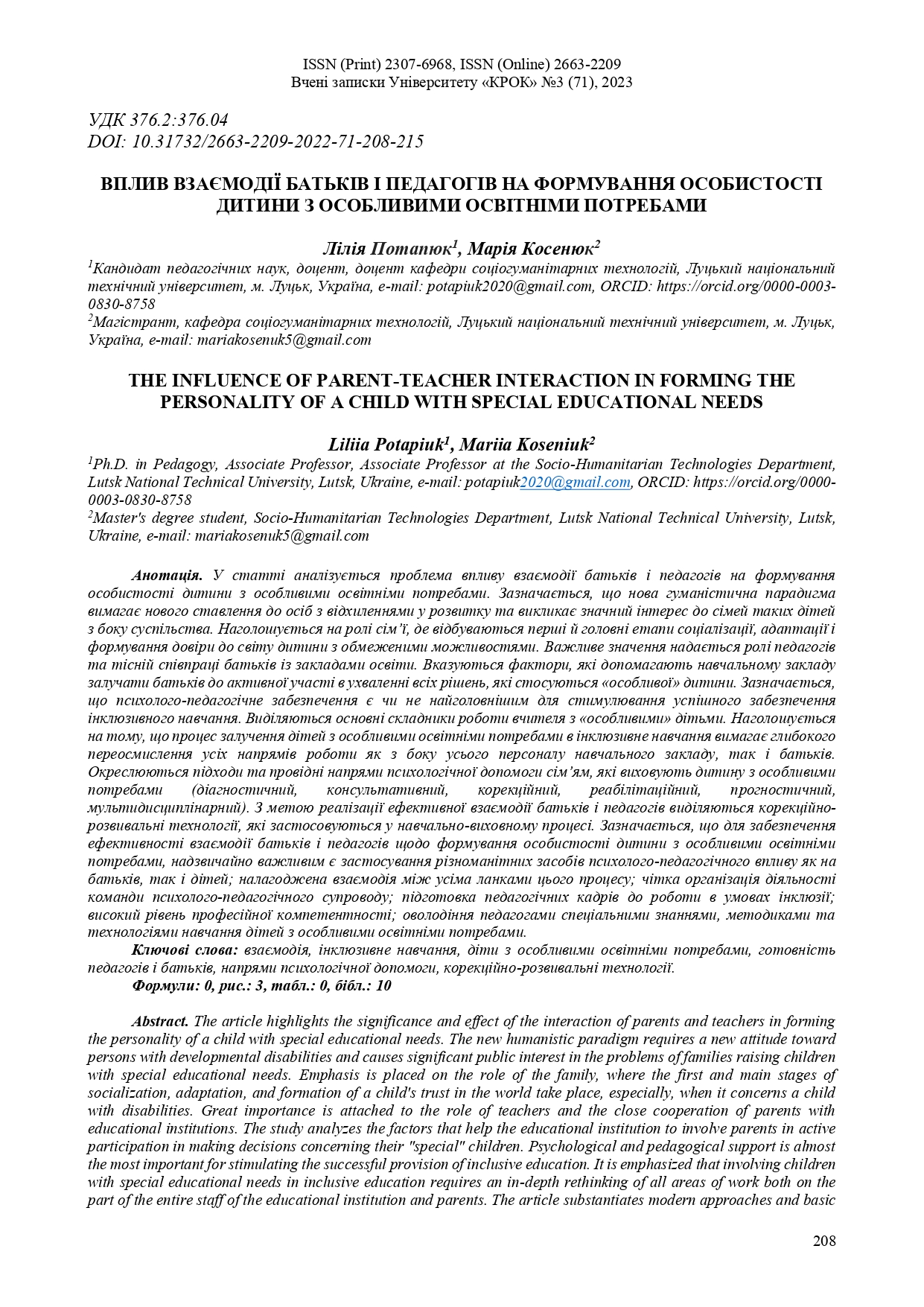THE INFLUENCE OF PARENT-TEACHER INTERACTION IN FORMING THE PERSONALITY OF A CHILD WITH SPECIAL EDUCATIONAL NEEDS
DOI:
https://doi.org/10.31732/2663-2209-2022-71-208-215Keywords:
interaction, inclusive education, children with special educational needs, readiness of teachers and parents, areas of psychological assistance, correctional and developmental technologiesAbstract
The article highlights the significance and effect of the interaction of parents and teachers in forming the personality of a child with special educational needs. The new humanistic paradigm requires a new attitude toward persons with developmental disabilities and causes significant public interest in the problems of families raising children with special educational needs. Emphasis is placed on the role of the family, where the first and main stages of socialization, adaptation, and formation of a child's trust in the world take place, especially, when it concerns a child with disabilities. Great importance is attached to the role of teachers and the close cooperation of parents with educational institutions. The study analyzes the factors that help the educational institution to involve parents in active participation in making decisions concerning their "special" children. Psychological and pedagogical support is almost the most important for stimulating the successful provision of inclusive education. It is emphasized that involving children with special educational needs in inclusive education requires an in-depth rethinking of all areas of work both on the part of the entire staff of the educational institution and parents. The article substantiates modern approaches and basic directions of psychological assistance to families raising a child with special needs (diagnostic, consultative, corrective, rehabilitative, prognostic, and multidisciplinary). The research findings confirm the effectiveness of the specified corrective and developmental technologies used in working with children with special needs and justify their significant impact on the formation of personality of such children in the interaction of parents and teachers. It is significant to use various means of psychological and pedagogical influence on both parents and children to ensure the effectiveness of the interaction between parents and teachers regarding the formation of the personality of a child with special educational needs. The conclusion is that well-established interaction between all links of this process, clear organization of the team activities aimed at psychological and pedagogical support, training of teaching staff to work in conditions of inclusion, a high level of professional competence, mastering special knowledge, methods, and technologies of teaching children with special educational needs are the signposts to achieving the goal.
Downloads
References
Козіброда, Л. (2020). Основні моделі організації інклюзивної освіти в умовах загальноосвітньої школи (початок ХХІ ст.) Педагогічні науки: теорія, історія, інноваційні технології, 8 (102), 15-27.
Кукурудза, Г.В. (2013). Психологічна модель раннього втручання : допомога сім’ям, що виховують дітей раннього віку з порушеннями розвитку : монографія. Х. : Точка, 244.
Потапюк, Л.М. (2021). Організація інклюзивної освіти у вітчизняному просторі. Вісник Університету імені Альфреда Нобеля. Серія «Педагогіка і психологія». Педагогічні науки, 1 (21), Дніпро, 119-126.
Потапюк, Л.М. (2021). Соціальна інклюзія у сучасних освітніх закладах. Витоки педагогічної майстерності : журнал / Полтав. нац. пед. ун-т імені В.Г. Короленка. Полтава. Серія «Педагогічні науки», 27, 205-210.
Сингаївська, І., Іванова, О. (2023). Коучинговий підхід як інструмент для встановлення довірливих стосунків між батьками і підлітками. Вчені записки Університету «КРОК», 2 (70), 166-172.
Allahverdiyev, M., Yucesoy, Y., Baglama, B. (2017). An Overview of Arts Education and Reflections on Special Education. International Journal of Educational Sciences, 19 (2-3), 127-135.
Evans, J., Vincent, C. (2017). Parental choice and special education. Choice and diversity in schooling : perspectives and prospects. London : Routledge, 102–115.
Haug, P. (2017). Understanding inclusive education: ideals and reality. Scandinavian Journal of Disability Research, 19 (3), 206-217.
McManis, L.D. (2021). Inclusive Education: What It Means, Proven Strategies, and a Case Study: Resilient Educator: Website. URL: https://resilienteducator.com/classroom-resources/inclusive-education (acceded 12.10.2023).
Somma, М. Bennett, S. (2020). Inclusive Education and Pedagogical Change: Experiences From The Front Lines. International Journal of Educational Methodology, 6 (2), 285-295.

Downloads
Published
How to Cite
Issue
Section
License

This work is licensed under a Creative Commons Attribution-NonCommercial 4.0 International License.

